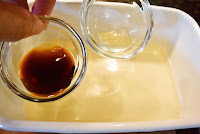Fuki to ebi no ohitashi / Japanese butterbur and shrimp marinated in light broth
Colorful coon shrimp (small spot shrimp), a local specialty, paired with fuki Japanese butterbur from our garden. Cooked coon shrimp we bought the other day happened to be inexcusably salty. After wondering if we should just throw them away, I decided to do an experiment, marinating them in lightly seasoned dashi to get rid of excess sodium while flavoring at the same time, a technique that works like magic with smoked salmon. And yes, the rescue effort was a delicious success.32 calories (1/2 of recipe); 4.8 g protein; 0.1 g fat; 2.0 g carbohydrate; 1.5 g net carbs; 145 mg sodium; 38 mg cholesterol; 0.5 g fiber
<Ingredients>
2 stalks (approx. 80 g) fuki Japanese butterbur, prep-boiled (84 g in photo)
Ohitashi marinade for fuki
100 cc dashi
1 tbsp sake & mirin (equal parts)
1/2 tbsp usukuchi pale soy sauce
1/4 tsp rice vinegar
50 g cooked botan ebi coon/spot shrimp
Ohitashi marinade for shrimp
5 tbsp (75 cc) dashi
1 tbsp sake & mirin (equal parts)
1/8 tsp usukuchi pale soy sauce
2 kinome sansho leaves (for garnish; not in photo)
<Directions>
1.

Cut fuki into 3-4 cm.
2.

In a small pot or stovetop-safe container, put all marinade ingredients for fuki, and bring to boil.
3.
When marinade starts to boil, add fuki,
Remove pot from heat when marinade starts to boil again, transfer fuki to zaru strainer, and fan to cool.
Separately, cool marinade.
3.

Once marinade is cool enough (cooler than room temperature), put fuki back in marinade, and chill in fridge for a few hours.
4.
In a small pot or stovetop-safe container, put all marinade ingredients for shrimp, and bring to boil.
Once boiling, remove from heat.
5.

Add shrimp, and chill in fridge until ready to eat.
6.
5-10 minutes before serving, bring out fuki and shrimp to warm them up slightly.
Serve fuki and shrimp in individual bowls (leave all marinade behind), and top with sansho leaves.
<Notes>
- Fuki is removed from the hot marinade to maintain its green color. Quickly cooling fuki by fanning is done for the same purpose.
- Marinade for shrimp can simply be microwaved. It is heated up once to ensure a milder blend of ingredients. Shrimp do not need to be heated in hot marinade (as they are already cooked, and overcooking results in rubber-like texture).
- The broth I used as ohitashi marinade for fuki is typically called happo dashi [versatile dashi] where the standard proportion is 8 parts dashi, 1 part sweetener (sake & mirin in above case), and 1 part soy sauce. I replaced half of soy sauce with a small amount of rice vinegar to reduce overall sodium content while mimicking the tingling sensation of soy sauce.
- According to my own measurements, the cooked coon shrimp contained 2.3% sodium (453 mg sodium per 50 g shrimp), of which over 70% was released into ohitashi marinade in 3 hours in the above preparation.
- Sansho leaves are optional but highly recommended if available. In addition to visual effect, they impart spicy and fruity citrus aroma and taste to other components.
Congratulations! Just now you have made Fuki to ebi no ohitashi / Japanese butterbur and shrimp marinated in light broth with your own effort. I am happy, hopefully with this recipe article can make your life becomes happier. Find other recipes that are worth it for you to try at home only at Food Recipe
Thank you for reading Fuki to ebi no ohitashi / Japanese butterbur and shrimp marinated in light broth And this post url permalink is https://chinesefoodsrecipe.blogspot.com/2016/06/fuki-to-ebi-no-ohitashi-japanese.html Hopefully This can be useful. Do not forget to share this paper until it can be useful for your friends








0 Response to "Fuki to ebi no ohitashi / Japanese butterbur and shrimp marinated in light broth"
Post a Comment